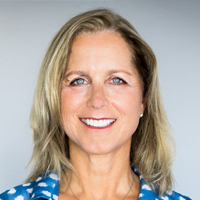At Rethinking65, we love to hear and tell stories about people who’ve successfully crafted new professions, new ventures and new interests midcareer or in retirement.
I recently spoke with Beatrice Schultz, CEO and owner of Westface Financial, a financial planning and college planning firm in Vancouver, Wash. Schultz worked in the semiconductor industry for more than 20 years before shifting gears in her 40s to become a financial advisor. She earned her CFP credentials in 2007 and opened Westface in 2008. Five years ago, she and her husband purchased a training and software company for financial advisors, now called MoneyTrax North America, of which she is CEO.
Jerilyn Klein: Tell me about your educational and career background — and what prompted you to launch a second career as a financial advisor.
Beatrice Schultz: I love numbers! As a chemical engineer with a master’s of science in management, working 25 years in the semiconductor industry was a natural fit. I experienced Corporate America, with all its quirks, and successfully navigated stock options, pensions, startups, investment decisions and technology. The technical aspects, numbers and pieces all made sense to me. I was doing what came naturally. I had no plans to leave, no plans to start my own financial planning business and no plans to launch MoneyTrax North America. Yet, life isn’t always how we plan! In fact, sometimes the best “plans” are those that happen organically.

I found myself in conversations with neighbors, friends and family who were struggling with financial questions I was able to answer. Through knowledge and real-life experiences, I discovered I could help them. This led to building a financial planning practice and, over time, led to launching MoneyTrax NA, where we help financial advisors through the Circle of Wealth® presentation software and advisor training.
Klein: What helped you succeed with your midcareer change and how did you convince clients to take a chance with you?
I am wired to help people. I find it interesting and I want people to be the hero of their plan, financial health, fitness, whatever it is — just to empower. And that is what gives me passion or pleasure.
Although I’m not 25 years in financial advisory, I’m 35 years of being in business — owning businesses, working for corporations, understanding what stock options are and all those things that somehow when you live it, you understand it. I’ve bought and sold businesses, bought and sold homes. Sometimes when you come into this business in your 40s, you actually can help people a little bit more, because it’s less of the academics and more about, “Yeah, these are things in life.”
Since I was already providing value to my clients prior to the official forming of the company, it was an easy transition into paid financial planning. They had already experienced the value of our advice and were ready to move forward.
Klein: What do you like about the college-planning niche?
Schultz: College planning is one of the largest wealth transfers most families will face, yet it is often not given the financial planning required.
Parents find themselves in a position where they are trying to determine how to pay for college and still retire. The pressure to live up to social obligations and implied responsibilities have caused parents to believe there are no options. That is not accurate. There are strategies that can be applied. When done properly, parents are able to transition their children into college without giving up retirement.
Helping my clients understand the options available when planning for college, allows them to reach their parental goals during an emotional and stressful time. To me, this is what financial planning is all about, reaching goals on multiple levels for my clients.
Klein: How have college planning and families’ college decisions changed during the pandemic — and do you expect any of these changes to be long lasting or permanent?
Schultz: Financially, all my families hated the idea that they were paying the same amount for a “lesser” college experience. With many students attending school remotely, none of the three pillars of the college experience were met — social, academic and financial fit. For both the 2020-21 and the 2021-2022 fall semester, I saw more families choosing the drivable distance and more affordable colleges versus the out-of-state, more expensive private or public colleges, when it came time to commit to a college.
I do not expect that colleges will reduce their cost of college; they will need to recover from lost revenue in 2020 and 2021. Some will be forced to close due to financial strain. I also do not expect the federal government to change their policy that allows parents to borrow parent PLUS loans up to the full cost of college. So, unfortunately, many parents will continue to spend more than they can afford on college for their students.
Looking ahead, those families that felt some financial strain during the pandemic will be more concerned about college costs and will be taking those expensive college choices off their list. Wealthier families who have done well during the pandemic, have kept their jobs, and saw their nest eggs grow will likely stay the course for their students’ college selection process.
I recommend that families on either end of the spectrum — and unfortunately the spectrum is widening — take a clear honest look at their retirement funding plan before spending the first dollar on college.
Klein: What made you decide that in addition to helping your advisory clients, you also wanted to try to help other advisors better serve their clients?
Schultz: There’s an educational part of me that wants to teach everyone. I’m a big believer in we all learn differently. So when we had an opportunity to buy this business and grow it, my husband and I were both very aligned. This was a good fit for us, as far as lifestyle, business.
It’s important to understand where clients are coming from and try to move them forward. But many people meet their advisor only an hour a year, so you’ve got to be careful not to overwhelm them with stuff. Let clients tell you what they want to learn.
Klein: You help educate advisors on how to explain financial concepts to prospects and clients and offer visual tools that enable them to show them their personal financial picture. What concepts are most misunderstood by clients who are approaching or are already in retirement?
Schultz: Clients have been indoctrinated that debt is bad. At MoneyTrax, we talk about liabilities versus debt, as a term, because not all debt is bad.
For instance, many clients are concerned about paying off the interest on their mortgage loan faster, to the detriment of not filling their savings and investment tanks. Too many seniors have a paid-off house and nothing in their savings and investment tanks. If they’re living on Social Security, the only place they can go is to their house to create additional cash flow. But if you can get a mortgage of 2.75% and on the other side you can make 3% on your money, conservatively, maybe a mortgage isn’t such a bad thing. Instead, it’s a wealth creator or a financial instrument.
Half the time, what we’re doing is educating people on how to create balance over their investing lifetime, so when they’re no longer getting a paycheck, they have the wherewithal to support the lifestyle to which they’ve grown accustomed.
Many advisors find it difficult to communicate financial strategies to qualified prospects and end up losing the sale. Our presentation software and training provides the insight needed to help clients understand and take action.
Klein: How has embracing new careers in your 40s and 50s helped you better understand and assist clients who are looking for new opportunities and want to stay engaged in the second half of their lives?
Schultz: As I work with clients facing forced crossroads of decision or those who are initiating their own transition, I find the ability to model the proven process of growth through my own journey has provided them confidence to take the next step.
I think of my client who was empowered to buy her first home at age 50. I think of my client who had the courage to take a calculated leap into entrepreneurship. I think of my clients who retired early with confidence to live their dream retirement.
Those are the thoughts that help me know that there are no limits to career and life opportunities. We need to embrace them and grow.
Jerilyn Klein is editorial director of Rethinking65.







